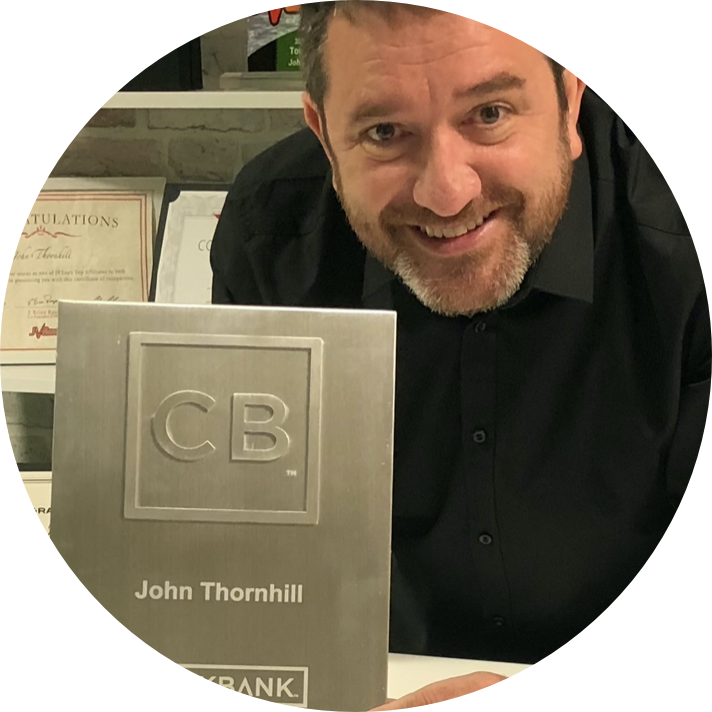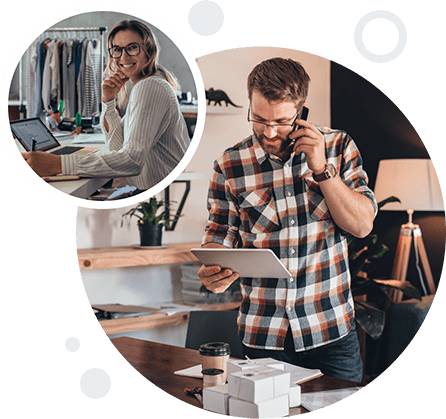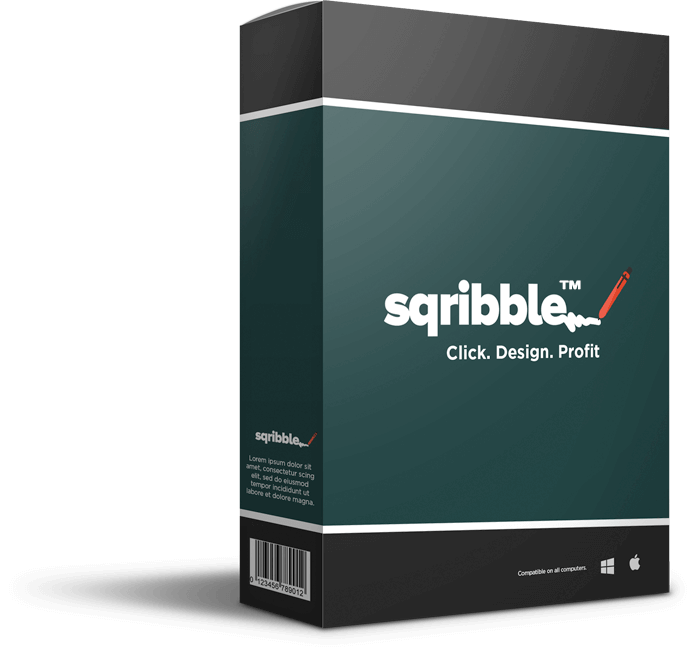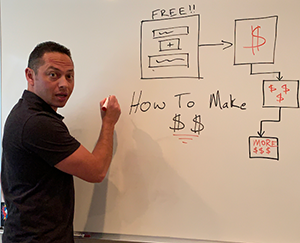Weekend Favs July 1 written by John Jantsch read more at Duct Tape Marketing My weekend blog post routine includes posting links to a handful of tools or great content I ran across during the week. I don’t go into depth about the finds, but I encourage you to check them out if they sound interesting. The photo in the post is a favorite for the week from an […] Embracing Your Entrepreneurial Superpower Being Unemployable written by John Jantsch read more at Duct Tape Marketing Marketing Podcast with Alysia Silberg In this episode of the Duct Tape Marketing Podcast, I interview Alysia Silberg. She is a leading venture capitalist in Silicon Valley, where she mentors tech startups and helps them go public. She is the CEO & General Partner of the investment firm Street Global. Her online radio show: Global Fireside Chats, brings together global industry titans to share insights on our fast-changing world. Furthermore, Alysia is a UN Women Empower Women Global Champion and an international board director with sovereign wealth fund experience. Her first book, Unemployable: How I Hired Myself details her life story and guide to financial freedom. It’s a guide that helps to change your mindset from “I can’t” to “I can”. Key Takeaway: Alysia changes the narrative of being “unemployable” and relates it to entrepreneurship and finding one’s superpower in business. Being unemployable is something to be proud of, as it often reflects the mindset and qualities of an entrepreneur, that can lead to innovation and generate changes. She emphasizes the importance of owning one’s uniqueness, taking risks, embracing curiosity, and seizing the opportunities presented by the digital revolution. The current business environment, which Alysia describes as a “modern-day renaissance”, it’s a time for innovation and new opportunities. It’s important to leverage the power of AI and digital tools to start and grow a business and develop each person’s superpower. Questions I ask Alysia Silberg: [01:52] Tell me a little bit about the artwork from the book cover. [03:07] Your book launch party was at a roller rink. How did that come about? [04:13] Why is the book called Unemployable? [07:20] Can you name a particular instance in your career where you felt like “This is going to work, this is like what I should be doing”? [08:58] You talk about superpowers and finding your superpower. Does your superpower have a name? [10:00] Back in South Africa you got shot, what did that story mean to your journey? [11:53] Is there anything about what’s going on right now in the current business environment that you think makes us a strong time? [15:25] What’s the first step you tell people to acquire the mindset you talk about? [18:23] What are your thoughts on the idea that there are proven business models and you don’t have to like to create a whole new thing from zero? [19:41] Based on where you see where we are today, what’s work going to look like in 10 years? More About Alysia Silberg: Get your copy of Unemployable: How I Hired Myself Connect with Alysia and follow her on Instagram More About The Agency Certification Intensive Training: Learn more about the Agency Certification Intensive Training here Take The Marketing Assessment: Marketingassessment.co Like this show? Click on over and give us a review on iTunes, please! Duct Tape Transcript Email Download New Tab John Jantsch (00:00): Hey, did you know that HubSpot’s annual inbound conference is coming up? That’s right. It’ll be in Boston from September 5th through the eighth. Every year inbound brings together leaders across business, sales, marketing, customer success, operations, and more. You’ll be able to discover all the latest must know trends and tactics that you can actually put into place to scale your business in a sustainable way. You can learn from industry experts and be inspired by incredible spotlight talent. This year. The likes of Reese Witherspoon, Derek Jeter, Guy Raz are all going to make appearances. Visit inbound.com and get your ticket today. You won’t be sorry. This programming is guaranteed to inspire and recharge. That’s right. Go to inbound.com to get your ticket today. (01:03): Hello and welcome to another episode of the Duct Tape Marketing Podcast. This is John Jantsch. My guest today is Alysia Silberg. She’s a leading venture capitalist in Silicone Valley where she mentors tech startups and helps them go public. She is the CEO and general partner of the investment firm, street Global. Her online radio show, global Fireside Chats brings together global industry tightens to share insights on our fast changing world. She is a UN Women Empower Women Global Champion, and an international board director with Sovereign Wealth Fund experience. We’re gonna talk about her first book, Unemployable: how I Hired Myself. So Alysia, welcome to the show. Alysia Silberg (01:47): Hi John. Very excited to be joining you. Thanks for having me. John Jantsch (01:50): So listeners can’t see this, although you’ll see, you can see it in the show notes, the video of folks obviously will see it, but I, you have a picture of the artwork from the cover behind you there in the in frame and I just, I wanted to start there because I just absolutely love it. So tell me a little bit about, I mean I frankly it’s a work of art. Alysia Silberg (02:08): Thank you. Um, very excited to hear you say that. So you talk about being unemployable, you talk about the future of ai. I know these are themes we’ll be chatting about today, but I had five designers trying to come up with what it meant to be unemployable and no one could convey that in imagery. And one of my founders who has an ed tech startup focusing on AI in Minneapolis, he said, let me sit down and let me take the book and let me put it in open AI’s design platform and let’s see what happens. And the, this is what the AI came up with. It’s the essence of a founder’s journey and it’s interpreting it, you know, that drive and ambition, you know, like that all of its embodied it that in this situation happens to be my image. But I’m, I’m very excited that we created that connection with the AI and it turned out the way it did. John Jantsch (02:55): Yeah, it’s kind of a, a block, almost like a Japanese block print illustration. It’s really fabulous. Okay, another totally unrelated topic to the book, sort of, I also love that you were doing a book launch party at a roller rink. How did that come about ? Alysia Silberg (03:11): Well, we’re gonna be, you know, the book is about finding your superpower and you know, superpowers are often unexpected and we discovered them in the weirdest of ways. And for me, they happened to be, I went to a pair of pink roller skates at five years old. I went to them more than anything on earth and I couldn’t afford them. No one in my family could afford them. And I had to figure out how I could get these pink roller skates and I built a business and you’ll read all about it in the book. Crazy wild Only founders understand what it means to, to want something so badly. And I never wore those roller estates ever. I treasured them cuz they reminded me of what’s possible. The dreamer, you know, anything is possible. And so the idea of having a a roller skating party for the book was the only thing I could do to honor each of our journeys. For me it’s roller skates. For you it was probably something else, but once a founder, always a founder and it was just, it’s the way it’s meant to be John Jantsch (04:05): Kind of sounds like a load of fun too. So there’s that . So why unemployable? I mean that that name specifically or that term specifically as opposed to entrepreneur or, you know, I, I know obviously you’re trying to convey something maybe a little deeper. Alysia Silberg (04:26): Absolutely. So I was trained as an actuary and I went for a career aptitude test at a bank. And I was like, you know, on my way thinking I joined, you know, a big bank and I was told I, I was unemployable in that attitude test and I was devastated. I was like, what do I do now? And I took it as an insult and at the time it was, you know, it wasn’t a compliment and it took me decades to own that. And what I do today now is I’m a researcher and I’m an investor. Like those are the things that make me the entrepreneur that I am. Right. And it was very tough choosing the title. I did a ton of research because everyone kept saying, but you’re not unemployable. How can you say you’re unemployable? And I’m like, well actually I am. (05:07): And it’s okay. It’s something to be proud of. The most important creators in history were basically unemployable to create innovation and change in these things. You’ve gotta be able to just live in a different way to many people and take risks. But there’s a lot of bravery around their title And I, I hope and honors the founder’s journey. So for everyone out there that feels the unemployable, as I say, I’ve learned to own it and be the queen of unemployable . And I know my family members are like, have you lost your mind? But it’s my truth. John Jantsch (05:39): No, it’s funny, I relate to it maybe in a little different sense. I, I’ve owned my own business for 30 years i’s I worked for somebody for about five years and said, you know, I, anybody can run a business. But uh, there was a sense of feeling unemployable but it was more of a probably a self-esteem issue than it was uh, you know, I can go out there and conquer the world. And I wonder if, if, you know, it’d be interesting if you’ve come to this place you’re in right now, but I’m wondering if a lot of entrepreneurs, you know, start with that same view a little bit regardless of what it turns into. Alysia Silberg (06:12): Absolutely. I think I suffered from huge imposter syndrome and the ironic part was it was that bank who didn’t want me and because of my imposter syndrome I decided no one wanted me. So when job offer offers came, I was like whoa, I don’t feel I belong here because there’s something wrong with me. Versus I’m a born and bred founder and this is what I do. Like you, you’ve been running a company for a very long time and I think definitely, I think many people and I think that’s what I hope to get out of the book where each person has something unique and instead of hiding from it and saying I have to con conform to what everybody expects me to do, rather say, okay, AI is bringing all this change. People are gonna lose their jobs, things are gonna be very different. Let me own my superpower, let me bold a business. And even if I do feel a bit like an imposter even now, I still feel like an imposter. I still have to work on it a lot. It’s okay. You will find customers that will support you just the way you are and you can bold something really cool as you have done John Jantsch (07:12): So. So you have started, have you lost track of how many companies over the years? Number doesn’t matter Alysia Silberg (07:18): Too many, John Jantsch (07:18): Many. But uh, I’m wondering if you could in hindsight, as we always do, kind of go back and think about like a time, maybe it was one company or maybe it was a number of companies where you felt like this is gonna work, this is like what I should be doing. And you know, that moment was, you know, not just validating but actually drove you forward. Absolutely. You think about a particular instance Alysia Silberg (07:43): For sure. I think it was the company that we built that brought us to the US in the first place where I just, it was connecting the dots and we were solving a problem for our customer. So it was a very early voice analytics pro uh, platform, which is helping salespeople sell better. Long before sales enablement became like this very ubiquitous thing. And it was just, there was so much intensity coming at us from the market where they wanted something better that wasn’t available. That even though everyone in South Africa said to us, you’re mad, what are you doing going to America for a sales app? The idea that there was a probability of greater than let’s say 10%, that we would bold something extremely valuable. That was enough of, I don’t know, just a spark of you know, like I’m gonna do this no matter what and even whatever happens, I’m doing this and I’m gonna make it work. But absolutely that one was just clear and I think I used that to look at startups today where when I can see something that’s gonna happen, you wanna be on that journey cuz it’s so exciting. John Jantsch (08:44): Yeah. And then it, and I mean this in a positive way then it becomes like a drug, right? You recognize it the next sentence like I want that high again. Right, . Alysia Silberg (08:51): Absolutely. Absolutely. It’s addictive. John Jantsch (08:57): So, so you talk a lot in this book about superpowers and finding your superpower. I’m curious, does your superpower have a name? Alysia Silberg (09:05): I’m obsessed with pattern recognition and I think growing up people saw me as a freak. Like it was very tough growing up cuz I was so different to everyone around me, like in South Africa and absolutely I’m not and I think that’s why I work so well with the AI because it’s so much better than pattern rec, pattern recognition than me. And faster is absolutely for sure. It’s better, I’ve gotta admit I have to, I’ve done a lot of work on my ego, a lot of humility, but I’m obsessed with finding patterns and stuff, which is really cool when it comes to investing. John Jantsch (09:38): It’s interesting, I’ve for years, you know, have told people that my superpower is curiosity and I think that’s probably very related to you know, pattern recognition. A lot of times, you know, I will read a book about architecture and you know, get my best ideas even though I have nothing to do with architecture , you know? Right. I think there’s a lot to that. Let’s go back to South Africa. You’re very young and you had an incident where you got shot or almost got shot or faced where faced and I obviously I I think the story bears interest in where you are today, but also just, you know, what did that story sort of mean to your journey? Alysia Silberg (10:18): Absolutely and I think it was a pivotal moment in the sense that I saw an environment that just made no sense to me. And I was very young and I saw the people around me where they chose to live in an environment that they believed made sense to them because they were fearful of going and as you say, being curious enough to try something that was better, even though it was very scary for me, I had no choice from that moment onwards. I knew I was gonna come to America and it never mattered what went wrong, what obstacle, what was thrown in my way. Like as you read the book, you’ll see the number of times where I had visa troubles and it was like I never gave up on the American dream where you say curiosity, the idea that you can live in a place where the sky is the limit for founders and you can bolt till your heart’s content and there’s so much support available and you’ll always find an investor, you’ll always find customers, you’ll always find team members. I didn’t grow up in that environment and so that moment that happened, even though it was the most terrifying thing to ever happen in my life, I still have the scar to this day and I could have had it removed, but I chose to have it because it’s a reminder of where I came from and to feel a sense of gratitude of where I am and that just never take for granted the luckiness to actually be here. John Jantsch (11:44): Is there anything about this moment in time that makes it like, now is when you should jump now is when you should do your, you know, whatever you’ve been thinking about doing there? Anything about what’s going on right now, you know, in in the current business environment that you think makes us a strong time? Alysia Silberg (11:59): Absolutely. I think, you know, I’m a student of the Renaissance. I’ve studied it in depth and we are living at the most exciting time in history. You know, many people are very frightened, you know, economically, politically, there’s a lot happening. But this is a time of great excitement and I think there are many people who fear the AI revolution and yes, there will be a lot of change in terms of jobs and in terms of all these things that will change, but ultimately they will change for the better. But
Recommended Story For You :

How To Make $3493 Commissions Without Doing Any Selling

Successful dropshippers have reliable suppliers.

People Think I Use A Professional Voiceover Artist. NO! I Just Use Speechelo!

Make Money Testing Apps On Your Phone Or Tablet

Make More Money or Lose Everything

Sqribble Is The ONLY eBook Creator You’ll Ever Need.

Work & Earn as an Online Assistant

Create Ongoing Income Streams Of $500 To $1000 Or More Per Day

It's The Internet's Easiest Side Business.


No responses yet